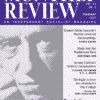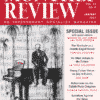
The United Fruit Co.
This poem was published in volume 18, number 4, of Monthly Review (September 1966). | more…

Confession
A new poem by Raymond Nat Turner. | more…

February 2022 (Volume 73, Number 9)
The COVID-19 pandemic shows no signs of going away, with a new wave of SARS-CoV-2 now occurring in the form of the more readily transmittable Omicron variant. In these circumstances, the issue of vaccine imperialism, dividing the Global North and the Global South, has taken on new significance. | more…

Lukács and the Tragedy of Revolution: Reflections on “Tactics and Ethics”
For Georg Lukács, revolution represented the realm of the objectively possible. He saw the tragedy of action as a necessary element in a movement toward greater human freedom synonymous with historical necessity. | more…

Bury Class Society Before It Buries Us All: Eleanor Burke Leacock’s Vision for a Marxist Feminist Anthropology
Eleanor Burke Leacock taught that transhistorical, universal male dominance is a myth, not a fact. Writing during the grimmest period of Cold War reaction, Leacock put forward a critique of the mainstream U.S. ideology, which took for granted the idea that there were only two genders, in binary opposition to each other, and that these were the direct product of so-called male and female nature. | more…

Magic, Necromancy, and the Nonhuman Turn
Across the humanities and the social sciences, critical attention is being given to the nonhuman as an ecological, philosophical, and political problem—the nonhuman here meaning anything from animals and plants to manufactured objects. Going under names as various as new materialism, political ecology, and object-oriented ontology, these studies comprise a movement that is largely described as the nonhuman turn. | more…
Anatomy of a Propaganda Campaign: Jeremy Corbyn’s Political Assassination
Jeremy Corbyn, the former leader of the British Labour Party, was subjected to a concerted propaganda campaign by the British right-wing military-industrial establishment and amplified by mainstream media. | more…

The Fight to Save San Francisco’s City College: An Organizer’s View
Free City! is a book for organizers, by organizers. Written from inside the struggle, it is a history of the five-year campaign to save San Francisco’s community college system from being shuttered by a highly politicized accreditation agency. The movement went on to win support and funding for the country’s most inclusive free college measure. | more…

Say, Gaza
A new poem by Linda Backiel. | more…

Better Build Back the movements—Ol’ Schmo’s tru blu 1%
A new poem by Black Agenda Report poet-in-residence, Raymond “Nat” Turner. | more…

January 2022 (Volume 73, Number 8)
Cuba’s world leadership in sustainable human development is of world-historic importance. | more…

Preface
This special issue of Monthly Review, The Cuban Revolution Today: Experiments in the Grip of Challenges, carries forward a tradition established six decades ago. The stance of the magazine reflects the view of C. Wright Mills. In his Listen, Yankee, Mills wrote that we don’t worry about the Cuban Revolution, we worry with it. This volume is put together in that spirit. | more…

Introduction
The U.S. government is obsessed with Cuba. Cuba is a small island, ninety miles off the shore of Florida, that is home to eleven million people. Not a day has gone by that the United States has not tried to overturn the Cuban Revolution, through the assassination of its leaders, invasions by proxy forces, preventing it from normal commercial and diplomatic relations, and encouraging social distress in the island to become a counterrevolutionary force. That is the level of the obsession. | more…